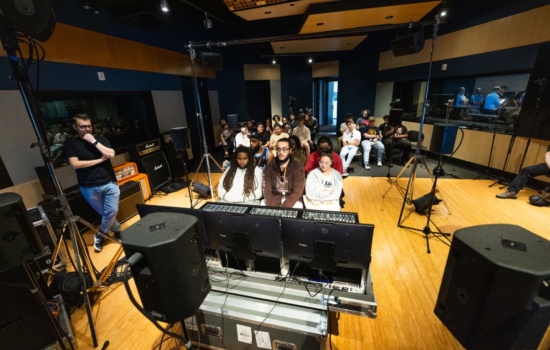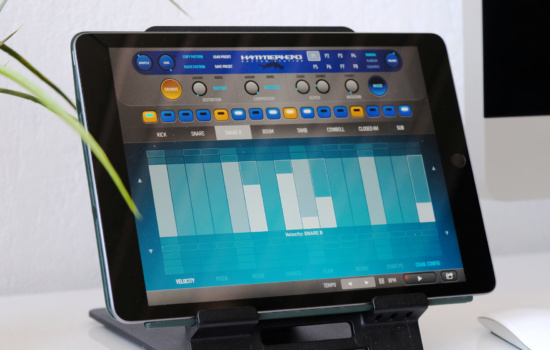Promotion Manager
Career Overview
Promotion Managers serve as the head of the radio promotions department and are in charge of netting radio airplay for the label’s artists.
Alternate Titles
Radio Promotion Manager, Record Promoter, Radio Promoter, Director of Radio Promotions
Avg. Salary
$78,7871
Salary Range
$53K – $115K1

How To Become a Promotion Manager
Career Description
Brett Greenberg is the National Director of Radio Promotion at Epitaph Records. As a Promotions Manager, he says, “You’re in charge of getting airplay. Radio still is, to this day, one of the best ways to get your artist discovered and heard.
“Hopefully, they hear the song on the radio and go to iTunes or Amoeba and want to buy the album or [they] go to Spotify and stream the song. Radio promotion is competitive as hell because every record label out there is jamming its artists to the same radio stations and you have to be really good because there’s so much competition and so many artists and you have to reach people.”
“Now, working for Epitaph Records, it’s like what do you do and where do you start? I’m one person dealing with monster record labels, monster bands, and monster promotion staffs that have all the money in the world and we’re competing with them. One label, one guy putting our artists out in the world, trying to get airplay, and it’s competitive.”
“With our bands, it’s all they have, everything they dream of — hearing their song on KROQ or whatever your local radio station is — and to fail them, it sucks. Sometimes you can get all the airplay in the world and nothing happens. It just depends on so many different things.”
“Sometimes it works in a really great way. I’ve had tremendous success at radio with artists like Taking Back Sunday, Atreyu, Hawthorne Heights, A Day To Remember and Bring Me the Horizon, who are probably one of the biggest rock bands in the world right now.”
He tells us “there are a million examples” of how a Promotions Director could reach out to his or her radio contacts to get them to listen to a record and hopefully, add it to their station playlist. “How do you even know the person? How are you going to get in touch with them?”
“There’s an art to these things and it has taken guys like myself and so many good promotions people out there years and years and years to establish relationships. How do you get to know someone? You call them. You email them.”
“These days, at a lot of radio stations where you used to have a Program Director, Assistant PD, Music Director, Research Director, Music Coordinator, and Programming Assistants, Website Marketing Manager, Website Content Producers, Advertising Account Executive, Video Jockey, now there could be one or two people at a station, where the Program Director is alone and programming three other stations — the pop station, the hot AC station, the JACK station, whatever it may be — and they have even less time to answer a phone.”
“So it takes a long time to develop relationships. You have to be personable and you have to get to know them, travel out there to see them. Who’s got the money and time to do that?”
“It’s not just radio promotions, we have social media people who are helping the label, we have a Publicist who is helping the artists and Sales Reps who are helping get the records in stores. We have a playlist person and all they do is try to get them on playlists on Spotify, Pandora, Apple programs.”
“This is how record labels can make money, through streaming. I love streaming. It’s the future. Radio’s still important and places like Sirius XM and national programs like HardDrive are important. I can get a record played on Sirius XM Octane and it’ll sell a thousand singles from their national airplay. There’s still impactful airplay out there and that’s what I do.”
“Radio is not obsolete. It can save lives because music saves lives. I’ve worked with so many artists out there who have helped save other people’s lives because their song meant something to them. That’s why we do what we do.”
“I do it for Epitaph, a label that I love. I loved it growing up. It has been around thirty-five years and it’s still going strong. Epitaph’s mission is to help Recording Artists make great music on their own terms. Our values are #1) Work for the artist. #2) Practice the Golden Rule. #3) Always keep learning.”
Salary
The average annual salary for Promotions Managers is $78,800. The salary range for Promotions Managers runs from $53,000 to $115,000.
Radio promotions people are salaried employees of the record label. How much they earn will vary based on the size and budget of the label itself.
Hey, what do you think about trying our new Music Career HelperMusic Career Helper really quick? It’s totally free and could help get your career moving fast! Give it a try. It’s totally free and you have nothing to lose.
Career Outlook
“To become a Radio Promotions Director, it takes thousands of miles on the road,” Greenberg says. “That’s how you do it. It takes years of blood, sweat, and tears to build these relationships and it doesn’t come overnight.”
A massive part of a Radio Promotions Director’s work lifestyle is dedicated to fostering these relationships. As an example of how this fits into his work, Greenberg tells us, “Just this week I was out three nights: Tuesday night, Wednesday night and Thursday night. I like to keep East Coast hours since we’re on the West Coast.
“Many of the radio stations are eastern, central or mountain time, so being a good promotion guy, you have to keep East Coast hours even if you’re on the West Coast. If you’re going to get in at ten o’clock in the morning, it’s already one o’clock in New York, and it’s like, forget about it.
So my day starts around 5:30 in the morning and by 6:30 or 7:00, I’m in the office talking to people over at SiriusXM Octane or WQBK in Albany or whatever it may be.”
“There are record labels who have fifteen people on their radio promotions staff and here I am all by myself dealing, like I said, with monsters. I’m up at 5:30 in the morning but sometimes I don’t go to bed till 2:00. I’m in the office all day, go to a show at night and I get home at midnight and after drinking hot tea all day, I can’t just go to bed!”
“It is a lifestyle and you are fighting for your bands, that’s something you have to remember; that your actions, what you do directly affects somebody else’s livelihood. A good promotions guy worries about that. I worry about my bands. At Epitaph, they’re family. But sometimes you have to fail to learn how to find success.”
“Not everybody succeeds all the time. Ask any person out there about the biggest disappointments in bands they’ve worked hard for and everyone’s got a list a mile long. Sometimes with those success stories, I’m one guy breaking out bands basically with one other person. Taking Back Sunday, Atreyu, Hawthorne Heights, A Day to Remember, Parkway Drive: those are just some of the ones we did with all odds against us. That’s why we do it.”
“It’s certainly a lifestyle in more ways than one. There’s also the drugs, the alcohol, the caffeine, the nicotine, the weed, and I don’t want to get all heavy on you, but that’s all part of it. Your life is other people’s entertainment. To keep going, to go one more mile, to get one more station visit — you’ve got to watch yourself out there.”
“People in this industry do get roped into a lot of things and you have to be careful. It sounds like a wild party, which might sound like a good thing, but it’s really not. The main priority is to work hard for your artists and to be and stay healthy.”
Career Path
Before landing a position as a Radio Promotions Director or Manager, most industry professionals began their career with an Intern role, Assistant role, or another entry-level position with a radio station or a record label. At labels with many people working in the promotions department, Promotions Staffers are sometimes promoted internally after spending serious time on the job at the label. It takes considerable experience and lots of hard work.
“You don’t just jump into radio promotion. It’s an impossible thing. You have to know people and all that,” Greenberg tells us. “I started in 1985 at a gospel radio station. It was an AM station; Brother Buddy Tucker ran it, but their FM station was a rock station, WSHE — ‘She’s only rock ’n’ roll’ — which was a legendary station in South Florida, in Miami.”
“So I got a job there, as a Jewish guy, playing gospel records and reading liners. It was a big pitch for money, ‘support our ministry’ or whatever, but I didn’t really care. I just knew I wanted to be in the music business and I knew this was a good place to start, so I got a job at a radio station.”
“A little bit down the line, six months to a year, I got a job at the rock station, SHE, so I was living my dreams, working at a rock station. I was there from ’86 to ’89 and then I was Program Director of a sports talk station from ’89 to ’90 and basically, I was in charge of about fifteen Board Ops and coordinating the schedules for all of our Talk Show Hosts. That was at 560 WQAM which is still a sports talk station today.”
“After that, it was 1990 and I think the Nirvana record Nevermind had come out and I was like, ‘I have to get a job at a record label.’ So I moved to Atlanta and got a job in the warehouse at Warner Bros. Records. At that time, it was Warner, Atlantic, and Elektra, and I remember boxing up Madonna’s Sex books.”
“Then I got a job at Sony and my job was doing inventory at Tower Records. I would basically inventory all the records once a month, every piece of Sony product in the whole store. It would take me three days to go from top to bottom with this little scanner. That’s where I started my music career with a record label.”
“I went from Warner Bros. Records in the warehouse to Sony Music. From there, after doing that for like a year, I got my first real job at a record label, which was as a Field Marketing Rep in Tampa, FL. So I moved from Orlando to Tampa.”
“Basically, what a Field Marketing Rep does — I don’t even know if those jobs exist anymore, due to the nature of the industry — is I would deal with record stores from Fort Meyers on up to Jacksonville and do music displays in windows, do promotions and airplay, make sure records were in stock. Whatever I could do to help hook a customer or make sure our records were actually in stores there.”
“That was my first job in the industry. I did that for about four years, then I moved to Atlanta, and within the same company, Sony, I got a job as an Alternative Marketing Rep, which was basically a step up from a Field Marketing Rep, where I would deal with independent record stores.”
“After doing that for about five years, in 1999, I finally got a job at Epic Records doing radio promotion. I lived in Charlotte, and worked North Carolina, South Carolina, Arkansas, and Tennessee: that was my first job doing radio promotion. I would go to all the cities: Memphis, Little Rock, Greenville, NC, Greenville, SC. One time I took a flight from Atlanta to go to Greenville, NC, and I ended up in Greenville, SC like a dummy!”
Thanks to years of experience with radio and record labels, Greenberg netted his current position as National Director of Radio Promotions. The trajectory for many in the business is similarly filled with twists and turns and different positions.
“To stay employed, I have moved from Ft Myers, Atlanta, Tampa, Atlanta, Charlotte, Atlanta, Miami, Atlanta, Chicago, Dallas, Chicago, Orlando, Los Angeles,” he says. “Thirteen moves just to stay employed at various record labels.”
“I’ve worked at WSHE Miami, WQAM Miami, Sony Tampa, Sony Atlanta, Epic Charlotte, Epic Atlanta, Epic Miami, Capitol Atlanta, RED Atlanta, Victory Chicago, Epic Dallas, Victory Chicago, Fly South Music Management Group and for the last five years, Epitaph in Los Angeles.”
Greenberg suggests aspiring Radio Promotions Managers start their career with an internship or part-time job in the field. “To do radio promotions, the best thing is to get an internship at a record label or start in radio,” he says.
“Get an internship or a part-time promotion job at a radio station because a lot of promotion people are ex-radio people like myself. Or if you’re an Assistant to a radio promotion guy, you’re exposed to all the formats across the country: mainstream rock, classic rock, alternative, modern AC, hot AC, top 40, rhythm, urban. What format talks to you? What music do you like the most?”
“I do rock and punk and metal because that’s my personal love. I would do anything to help them succeed at their goal of becoming self-sustaining artists who can pay their rent at the end of the month because of the money they made at shows, the merch, the streaming or their record sales.”
“There are ways in. Search for those ways in. Do not stop. If this is your passion, if this is your goal, if music is what you want to make a living out of and base your life on, there are absolutely ways to do it. You can get in.”
“Don’t be a pain in the ass, don’t blind copy the world asking for jobs. Be personable. Be one-on-one. Ask for interviews at your local radio station or email saying, ‘Hey can I ask you a couple questions about your job?’”
It’s also important to be willing to move for work. Music industry jobs aren’t just in the main media centers like New York, Nashville, and Los Angeles. Greenberg says, “I have moved thirteen times. I’ve moved that many times to stay employed and feed my cats.”
- “You just have to get out there and do it. You’re the only one who’s going to make it happen. You want to learn about radio, get a job at a radio station. Do college radio.
- “Try to get an internship while you’re in college at your local rock, pop, rhythm, urban, country station. I went to a broadcasting school right out of high school; I didn’t go to college college. It was like a nine-month course and the first month I was there, I had gotten a job at a gospel radio station because someone said, ‘I heard they’re hiring Board Ops at the gospel station,’ and that’s how it started for me.
- “Attend broadcasting school or study Broadcasting while you’re in college. It’s pretty important to learn about.
- “Again, go right to the source and intern. Right now at Epitaph, we have about five Interns that are there Monday through Friday or, for some, two or three days a week. They help out with radio, with sales, and the mundane things like sending band posters to all the venues that they’re performing at so they can put them up in the windows saying ‘Joyce Manor is playing, Rancid is playing’ whatever it may be.
- If you have questions, go to the people who can answer them.”
Experience & Skills
“It’s such a hard thing because it’s not something you can teach,” Greenberg says. However, experience and certain skills can be gained through on-the-job experience. He reaffirms that “interning at record labels is always a good thing. Lots of record labels have internship programs with colleges so that’s a good place to learn. You just have to go out there, do it, and gain those experiences.”
Time spent on the job through an internship will help aspiring Promotions Directors understand the question Greenberg says is vital: “What does radio do? They’re looking for listeners and they’re trying to hang on to listeners.
“What does a Radio Promotions Person do? They deal with Program and Music Directors.” Knowing this will help Radio Promoters pitch better and understand the limitations they’re working under. He says, “Say there’s a rock station out there that says, ‘We don’t play any music with screaming in it.’ Sometimes, it’s hard to change a philosophy, it’s hard to break format.”
“You have to be a people person,” Greenberg says. “That’s very important because all day long I talk to people on the phone at radio stations across the country. I talk to this Music Director. I talk to this Program Director. I talk to this Operations Manager, this GM —- all you’re dealing with is people. When you find the opportunity to really get to understand a person, then you’re truly a good Promotions Person.”
“You get to be really good at life because, for the most part, that’s what work and life are: navigating through an ocean of people for jobs, for raises, to get hired. The trust you build with people matters and [those are] the people you come up with and get old with. Relationships mean the world. Relationships are everything.”
A genuine passion for the label and its artists is paramount. “It’s not just ‘I was looking for a job and I found a job,’ if I can quote Morrissey. Do what you’re passionate about. You see people who are miserable and hate their jobs.”
“I would hate my job if I was working for artists who did not speak to me, but I’m working for Bad Religion, Deafheaven, Plague Vendor, Pennywise, Japandroids, A Day To Remember, Bring Me The Horizon, Joyce Manor, Social Distortion, Jade Jackson, Parkway Drive, Falling In Reverse, Alkaline Trio, Descendents, The Drums, This Wild Life. We have artists who I love and that’s why I do it. So I feel fortunate and lucky.”
It’s also important to be the type of person who can deal with rejection.
He says, “How many times do you hear ‘We don’t get this band. We don’t understand this band’? And it ends up being a smash on radio and you were right, but you can’t take it too personally when someone says no because in my job, that’s the first thing they want to do is say no.
Think about in your own life; how many artists are you willing to accept into your own life, to buy on vinyl, to know every word to every song by your favorite artist?”
“I’ve got twenty new artists. How many artists do you hear on the radio and say ‘Oh, I’ve got to buy that’? How much time do you give to new music out there from artists?”
“It’s hard because in this day and age, with so many fewer jobs and everything else, nobody has time to listen to a full song. If you’re listening and it doesn’t grab you in ten seconds -— when you’re listening online and there’s an ad and you’re pissed you have to wait ten seconds, ask yourself what was the ad and you’re like ‘I don’t know’ — we’re trying to reach that person.”
Education & Training
Greenberg recommends studying Broadcasting in school to get an idea of how radio stations (and therefore Radio Promoters) work. No specific college degree will guarantee a career as a Director of Radio Promotions, but gaining professional training at a college radio station will definitely help.
As an example, Greenberg mentions college “stations like WSOU in New York, which is a world-famous metal station, [from] where many have found work at some of the biggest record labels, management companies, SiriusXM, Music Choice, MTV, etc. WSOU is the greatest.
If you’re in college, try to get an internship at a record label but absolutely join your college radio station.” College radio isn’t just a training ground; it’s also very influential for certain artists. He adds, “We have people at Epitaph like myself who call college radio just as often as KROQ. Support your local college radio station!”
Additional Resources
There are no specific professional organizations or unions dedicated to radio promotions. For online resources, Greenberg recommends, “AllAccess.com is probably one of the greatest resources for jobs.” Radio Promoters can take advantage of the site for its “database where you can put in any station’s name and find out who the Program Director is.”
FAQ
What is the single biggest suggestion you would give to someone wanting to get into this career?
“My suggestion is to go back to where it starts, at the record labels and the radio stations. Practical, hands-on experience is the most important thing. Our Head of Marketing at Epitaph started as an Intern. Our Sales Assistant started as an Intern.
“Our Social Media/Advertising Buyer started as an Intern. Basically, everyone but me and two other people started at Epitaph as an Intern. That’s it, that’s where it’s at.”
What’s the #1 mistake people make when trying to get into this career?
“Everybody makes mistakes and everybody hopefully learns from mistakes. I learn from everybody. There are so many great promotion staffs out there and so many great artists they’re promoting, and whether good or bad, they’re all lessons for your own personal work.
“You take the good and bad and everything and learn from it. What are we doing? We’re just dealing with people. There’s a way to work with people and there’s a way to piss people off.”
What is the question people should ask about this career but rarely do?
“It’s actually the opposite! My mom, my sisters, my best friend (who I talk to every day), they’re like, ‘What do you do?’ People are absolutely confused by my job. They’re baffled by it. Usually, they think it’s all smoking weed, concerts, and traveling. But like I said before, all that will grind you down tremendously.”
What is one thing I should have asked which I didn’t?
“We could talk about the structure of a record label, which I think I touched on a little bit, about what record labels do and all the services they provide —- whether it’s promotion, sales, publicity, marketing, social media.
“Again, it’s hard to make an impact with a band. You do that by touring; those are the best careers for bands, the ones they make out on the road without radio or publicity involved. It’s that they’re playing and someone’s watching them, saying, ‘I love this band,’ then they find out about that band.”
If you could describe in one word what makes you successful, what would it be?
“Caring. I care. I work for one person, Brett Gurewitz, and he employs a lot of people. The better I do, the better the company does, and the better the employees do and the better our bands do.
“I care about those artists and without the artists, what’s a record label? What’s streaming, what’s a download, without the artists and their music? It all starts there.
“When you see all the business that springs from one three-minute song or one album, it all stems from that. You have the band, the artist, the singer, and from there you have the Producer, the studios, and so on. It all stems from music; I love the music.
“If you don’t care, you don’t give a shit about your job. You don’t think people can tell? We’re not selling products. It might be easier if I was selling a can of Coke, but every single band or song, it’s not a product, it’s a living, breathing thing and I care about it.”
Sources

Brett Greenberg
Brett Greenberg is the National Director of Radio Promotion at Epitaph Records, home to some of the biggest names in punk and alternative music, including Bad Religion, Descendents, Joyce Manor, Rancid, Pennywise, Deafheaven and A Day To Remember.
For more music industry insights from Brett, check out his interview with All Access and career spotlight in Play MPE.
References
- 1. "Promotions Manager Salaries in United States". Glassdoor.com. published: Dec 22, 2019. retrieved on: Dec 18, 2019






















